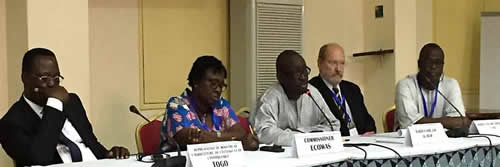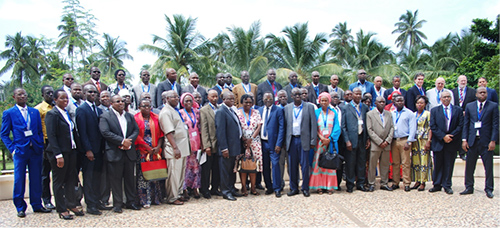Group photograph. Picture © AU-IBAR (2016)
A regional seminar organized by the African Union (Inter-african Bureau for Animal Resources, AU-IBAR) in collaboration with the OIE and the United Nations Food and Agriculture Organization (FAO) met from 20 to 24 June in Lomé (Togo) 14 of the 15 member states of the Economic Community of West African States, ECOWAS (Benin, Burkina Faso, Cabo Verde, Côte d’Ivoire, Gambia, Ghana, Guinea, Guinea Bissau, Liberia, Mali, Niger, Nigeria, Senegal, Sierra Leone and Togo). Only Liberia did not make it to Lomé.
The seminar took place as part of a cycle of regional workshops on good veterinary governance and in particular the development of veterinary legislation at regional community level, with a central theme focusing on the control of animal diseases. The seminars are part of the implementation of the Strengthening Veterinary Governance in Africa (VETGOV) programme, funded by the European Union and implemented by AU-IBAR, OIE and FAO.
Drs. Komla Daniel Batawui, Director of the Veterinary Services of Togo, Martial Petitclerc, on behalf of the OIE, Wora Salami Ibrahim, on behalf of FAO, Baboucarr Jaw, on behalf of AU-IBAR and Vivian Iwar, on behalf of the ECOWAS Commissioner for Agriculture, Environment and Water Resources, delivered speeches, preceding the official opening by the representative of His Excellency the Minister. Indeed, the seminar was officially opened by Dr Koffi Gbetogbe, representing His Excellency, Colonel Ouro-Koura Agadazi, Minister of Agriculture, Livestock and Water Resources, Member of the Government of the Republic of Togo.
The speakers thanked the organisers and participants for their commitment to improving veterinary governance in Africa and the excellent welcome offered by the Republic of Togo.
In total, apart from stakeholders and representatives of regional and international organizations, 39 veterinary and legal experts participated in the seminar, which was facilitated by experts from the OIE, AU-IBAR, FAO and ECOWAS.
After a recap of the general principles pertaining to the quality of veterinary legislation as included in OIE Terrestrial Animal Health Code (Chapter 3.4.) and a short history of 55 years of development of animal health in Europe, working group sessions (2 francophone groups and one anglophone group) allowed participants to confront the specific challenges of regional community legislations.
The facilitators of the 3 groups emphasised the importance of a systematic methodology, to be based, in part, on the cycle “define the problem to solve”, “define the objective”, “adapt the strategy” and “take action (in terms of legislative drafting)”, as well as the importance of compliance with the criteria for the quality of legislation, as recommended by the OIE, which include acceptability, applicability and sustainability, all of which require impact assessments.
The work conducted led to recommendations to ECOWAS Member States, to ECOWAS itself and to the continental and international organisations, amongst which we highlight:
The next regional seminar will be held in Arusha, Tanzania, from 8 to 12 August 2016, for the Member States of the East African Community (EAC).

